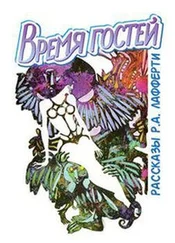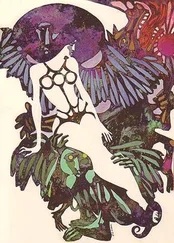“Horribly, horribly dead,” Selma was chanting in a little-girl singsong voice. “Horribly, horribly dead. Oh please, somebody come and help me look at her. I can hardly manage to look at her all by myself.”
Dead Dixie Late-Lark was an exact life-sized replica of her own many times-transfixed fetish doll. Her throat was just as flamboyantly and terribly cut as the doll’s had been. The same thorns and pins and needles ran through her, but now they were meter-long thorns and two-meter-long needles. And her mouth was very wide open, as had been that of the doll; and Dixie was likewise screaming horribly and silently.
And a tittering, a giggling in the Thieving Bears’ fashion, was coming from her silently screaming mouth and also from her laid-open throat. How ghastly!
The horror was broken a bit, or diverted into a wondering exasperation, by Benny Crix-Crannon’s voice booming, “Here’s another one of them. This one’s better done. It’s good!”
Yes, it was another horribly dead Dixie Late-Lark, with her throat cut even more savagely, with her poor body transfixed with even longer thorns and needles, with the tittering and giggling from her wide-open and silently screaming mouth even more disconcerting.
In all, they found seven life-sized versions of Dixie Late-Lark horribly and ritually murdered. Then all seven of them jumped up, turned into rather young Thieving Bears, and ran away tittering. And the very stones of that planet seemed to join in that tittering and giggling.
But where was Dixie Late-Lark herself? Was that not a pertinent question? More pertinent questions may have been: why did all the explorers stop wondering what had happened to their colleague Dixie Late-Lark? And why did they now feel that her disappearance was unimportant?
“I have lost my judgment,” George Mahoon lamented. “I’ve still got most of the pieces of things in my mind, but I can no longer put them together. Putting things together is what judgment is. One of you others will have to take over the captaincy of this expedition.”
“Oh, bother the captaincy!” Gladys Marclair rejected it. “Expeditions would be better without captains anyhow. And you can’t lose something that you never had, George. Let’s play ‘Ask the Question’ with this situation. And let’s wonder why no bunch, coming here, has played it before. This is an Earth-sized planet and remarkably monotonous. On its look-alike continents, there are hundreds and thousands of little low plains or meadows comparable to this Plain of the Old Spaceships. Why have all the expeditions to this world, from that of John Chancel to our own, landed here within one thousand meters of each other? Instructions for exploration landing sites have always been ‘Random selection, tempered with intelligence.’ And another instruction has been ‘Examine new ground wherever possible.’ For whose convenience have we all landed in this one place? Oh, your diminished judgment, George! Probably somebody has been eating the hippo out of your hippocampus (I’ve always believed that the ‘little hype’ is the center of the judgment as well as of the memory), so now you’re not as well hyped as you were. What if hardly any of the area of this planet has been checked out?”
“Oh, we made sixteen scanning circuits of Thieving Bear Planet before we landed,” George Mahoon said. “Sixteen circuits will give a very good recorded sample. And some of the previous expeditions made the full sixty-four scanning circuits, and the full scan doesn’t miss much.”
“Do we believe that the Thieving Bears are to be found in all parts of this planet, George?” Selma Last-Rose asked.
“I don’t know. Do we believe it, Benny?”
“Oh no. The Thieving Bears are strictly small-species and small-area creatures. Their crankinesses as well as their brilliancies indicate that they have far too small a gene-pool. They have to stay close together in a small area to ‘keep warm’ in the special (of a species) identity-survival sense.”
“As to myself, I’ve lost more than my judgment,” Luke Fronsa mourned. “I’ve lost all my ideas, and all that I have left now are notions. Somebody is eating all my ideas right out of my head and leaving only the hulls of them. Did you know that notions are only the shells or hulls of ideas after the meat is eaten out of them?”
The bears were toothless, and they were playful. Sometimes they came gliding in on the air, and they might be practically invisible when the light was in their favor. They came gliding in or ambling in, and they tagged the people gently as a breath. But whenever they touched the people, however briefly or lightly, they left what seemed to be very small entering marks. And they also left a redness, like the stings of nettles. One of the explorers (no matter which one; they had begun to run together, even in their own regard) said that the Thieving Bears were really a species of giant insects, insects with strange appetites and always hungry.
Seven days and nights went by very rapidly. It was a giddy world in this respect, fast-spinning: for seven days and nights on Thieving Bear Planet were the equivalent of only about eighteen hours on Old Earth or sixteen hours on Astrobe. And the fast-spin did make a difference on Thieving Bear. It was because of the fast-spin that there were no large treelike plants, not even any very large bushes. There were small bushes, and there was the non-gramineous grass.
People without an accompaniment of ghosts are a deprived people. They will descend to almost any depth of “oriental” cultishness or modish superstition or silliness or astrological depravity to hide the fact that they have lost their ghosts.
Ghosts without an accompaniment or “neighborness” of people are similarly deprived, and they will cast themselves into the most bizarre roles or forms to try to create a company for themselves.
Both of these conditions are unhealthy.
—Terrance Taibhse,
Introduction to Ghost Stories of Sector 24
The storminess of Thieving Bear Planet wouldn’t have permitted any botanical constructs taller than small bushes. And the fast-spin of Thieving Bear compelled certain surface conditions for that world. On most worlds, the hills go up. On Thieving Bear Planet, the hills went down.
The upper levels of all the continents of Thieving Bear were flat and lush, and sometimes they were swept by violent winds. And down from them, the hills ran to the sheltered plains or meadows or circle-valleys (such as was the Plain of the Old Spaceships), and on these lower levels the winds were less violent.
Two of the seven short nights just past had been “electric nights,” and the ghosts walked on electric nights. The electric nights were highlighted (literally) by massive thunderstorms and plasmal displays. (The odds are that these storms are more violent than the storms where you come from.) The lightning piled up on the high places, roaring like lazaruslions. Then it rolled down the hills like waterfalls and formed hot and spitting pools on the lower plains and meadows.
The ghosts were always there, but some of them were ordinarily like empty balloons. On the electric nights, they filled up with lightning and manifested themselves. But others of the ghosts were always low-key, living out their endless nights and days till they would finally fade away after a long era. One of the ghosts was that of John Chancel, one of the earlier visitors to Thieving Bear Planet, usually called the “discoverer” of Thieving Bear, but now he said that this wasn’t true. During the second of the electric nights, Chancel’s ghost sat in the cockpit room of the ship with the explorers and lovingly handled the eight hundred knobs, wheels, levers, push buttons, keyboards, and voice boxes that commanded the ship. The ships hadn’t been so sophisticated in his day.
Читать дальше




![Рафаэль Лафферти - Дни, полные любви и смерти. Лучшее [сборник litres]](/books/385123/rafael-lafferti-dni-polnye-lyubvi-i-smerti-luchshe-thumb.webp)
![Рафаэль Лафферти - Лучшее [Сборник фантастических рассказов]](/books/401500/rafael-lafferti-luchshee-sbornik-fantasticheskih-ra-thumb.webp)